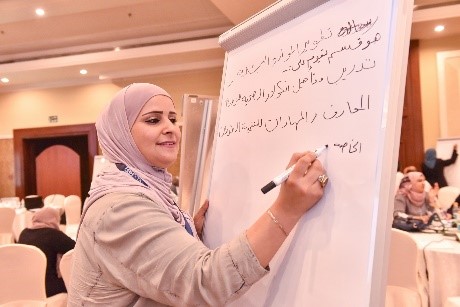
26 Feb HRH2030 Promotes Participatory Planning Approach for Jordan Ministry of Health
“This is the first time that I got the chance to participate in … strategic planning meetings and workshops. It [has] increased my knowledge in developing strategic plans and motivated me to plan for our division,” said Ola Faquseh.
Ola works in human resources for the Jordan Ministry of Health’s Karak Health Directorate. Recently she joined more than 70 colleagues from across the country to participate in a series of workshops designed to shape the three-year strategic operational plan of the ministry’s Administrative Affairs Administration (AAA).
Organized by the USAID HRH2030 (Human Resources for Health in 2030) program, the strategic planning workshops boosted staff ownership of the Ministry of Health’s vision of “a healthy community within a leading comprehensive health system ensuring equity, efficiency, and high quality at the regional level.” The AAA’s three-year plan will feed into the ministry’s overall strategy for 2018 to 2021.
“In many organizations, senior managers develop strategic plans with minimal or no staff involvement. These managers pull together strong goals, targets, and interventions with the expectation that departments and the individuals within them are ready to implement. Unfortunately, lack of staff involvement in the planning stage often hinders implementation and leads to unexpected challenges,” explained HRH2030 Jordan Project Director Edward Chappy.
HRH2030 kicked off the strategic planning workshop series by presenting its findings from a recent assessment of the ministry’s human resources systems and capacity needs. The assessment report proposed key changes to Ministry of Health policies and procedures, including more comprehensive training for human resources staff and a strong monitoring and evaluation plan for measuring progress. Participants then worked together to assess their directorates’ strengths, weaknesses, opportunities, and threats to determine areas of focus for the next three years.
Many of the workshop participants are enrolled in HRH2030’s two-year human resources management and development training course. Several of these individuals were happy to apply their new skills to developing the policies, procedures, and plans that will impact their work.
“It was ideal timing! I participated in the strategic planning workshop to put the skills I gained [through the training course] into effect by drafting with my colleagues the new strategic plan. I am really grateful for that.”
— Sabah Al-Tarawneh, Human Resources, Karak Health Directorate
The HRH2030 team collected feedback from the strategic planning workshops and worked with the AAA to finalize its strategic operational plan, which the Ministry of Health is expected to adopt in March 2018.
With the success of the strategic planning workshops, ministry leadership has recommitted to engaging staff in the strategic planning process. “In line with the ministry’s [goal of] achieving excellence, we have started involving staff at all levels in strategic planning. This will contribute to increasing productivity and ownership and improving health care services,” reflected former AAA Director Dr. Fadwa Al-Shawabkeh.
Photo: Sabah Al-Tarawneh from the Karak Health Directorate participates in the Strategic Operational Plan Workshop in Amman in July 2017.





